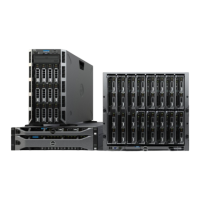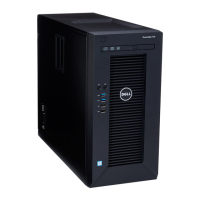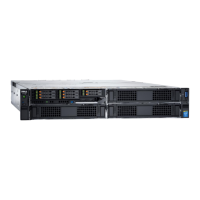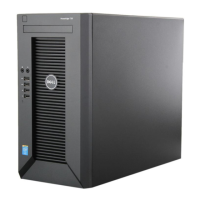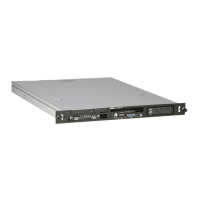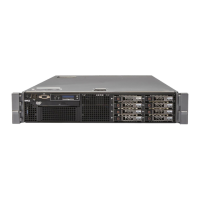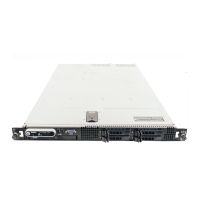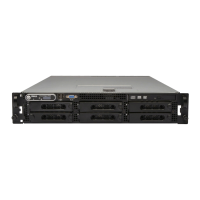Do you have a question about the Dell PS-M4110 and is the answer not in the manual?
Provides important information, cautions, and warnings for optimal system usage and safety.
Details new features and support added in the current CMC firmware release.
Summarizes the main management and security features provided by the CMC.
Describes the physical layout and component locations within the chassis.
Lists the TCP/IP ports required for remote CMC access and client port usage.
Specifies the minimum CMC firmware versions required for blade servers and IOMs.
Details the supported connection types for remote access to the CMC.
Lists the modular systems compatible with the CMC.
References additional documentation for system management and components.
Prerequisites and initial steps before configuring the CMC environment.
Information on installing CMC hardware, including redundant CMC setup.
Step-by-step checklist for accurately setting up the chassis.
Instructions for establishing a basic network connection for CMC redundancy.
Guidance on daisy-chaining multiple chassis to reduce network connections.
Steps to install remote access software for managing CMC.
Details on configuring web browsers for managing CMC, servers, and modules.
Procedure to access the CMC using a supported web browser.
Steps to log into CMC using local, Active Directory, or LDAP user accounts.
Instructions for logging into CMC using a smart card for enhanced security.
Procedure for enabling and using Single Sign-On (SSO) for CMC access.
Guide to accessing CMC and its components using the RACADM command line interface.
Information on the number of concurrent CMC sessions supported by various interfaces.
Steps to download the latest CMC firmware version from the support website.
Methods to view installed firmware versions using CMC Web interface or RACADM.
Procedure for updating CMC firmware using the Web interface or RACADM.
Instructions for updating the iKVM firmware via CMC Web interface or RACADM.
Process for updating IOM infrastructure device firmware using CMC Web interface.
Steps to update the iDRAC firmware on servers using the CMC Web interface.
Guide to updating server components firmware using the Lifecycle Controller.
Provides a live graphical view of the chassis and its components' health status.
Explains the chassis representation and component status icons in the GUI.
Procedure to view server model name and service tag via tooltips.
Displays a summary of all installed components within the chassis.
Methods to view the health status of all installed servers in the chassis.
Details for viewing the health status of all installed I/O Modules (IOMs).
Information on viewing the health status and fan speeds of chassis fans.
Procedure to view the health status and power readings of Power Supply Units (PSUs).
Steps to view and modify CMC network settings via Web interface or RACADM.
Procedure to configure network security settings for IPv4, including IP range and blocking.
Guidance on configuring VLAN tag properties for CMC network traffic segregation.
Enabling and configuring CMC services like Serial Console, Web Server, SSH, and Telnet.
Instructions for setting up a chassis group for monitoring multiple chassis from one lead chassis.
Details on obtaining and managing SSL certificates for secure CMC access.
Method to configure multiple CMCs with identical properties using RACADM.
Procedure to modify the CMC IP address by editing the configuration file.
Guidelines for setting unique slot names to identify individual servers within the chassis.
Steps to configure iDRAC network settings for installed or new servers.
Procedure to specify the first boot device for servers using CMC Web interface or RACADM.
Method to apply BIOS settings from one server to multiple servers using server cloning.
Steps to configure alert destinations for SNMP traps and e-mail alerts.
Procedure to configure IP addresses for receiving SNMP traps.
Instructions for configuring SMTP server settings and e-mail addresses for alerts.
Describes different user types and their associated privileges within CMC.
Steps to configure local CMC user accounts with specific access permissions.
Guide to integrating CMC with Active Directory for user management.
Explains Active Directory integration using the standard schema method.
Procedure for configuring CMC with Active Directory using standard schema.
Overview of the extended schema solution for Active Directory integration.
Steps to configure generic LDAP directory service for CMC authentication.
Lists the network and system requirements for Kerberos authentication.
Details the pre-requisites for configuring SSO and Smart Card logins.
Instructions for generating a Kerberos keytab file for SSO and Smart Card authentication.
Steps to configure Internet Explorer and Firefox for Single Sign-On.
Procedure to configure CMC SSO or Smart Card login for AD users via Web interface.
Overview of CMC's serial, Telnet, and SSH console capabilities.
Instructions for using SSH for secure command line access to CMC.
Guide to setting up Public Key Authentication for automated SSH access.
Procedure to establish serial console connections to servers and I/O modules.
Steps to enable serial console redirection in the server's BIOS setup.
Explains the FlexAddress feature for replacing factory WWN/MAC IDs with chassis-assigned ones.
Compares the MAC address provisioning between FlexAddress and FlexAddress Plus.
Instructions on how to activate the FlexAddress feature using an SD card.
Procedure to deactivate the FlexAddress feature and restore the SD card.
How to view FlexAddress status for the chassis or individual servers.
Guide to enabling or disabling FlexAddress for fabrics and slots at the chassis level.
Explains how fabric management prevents invalid hardware configurations.
Describes common types of invalid I/O fabric configurations and their causes.
Steps to specify network settings for I/O Modules using CMC Web interface or RACADM.
Procedure to reset IOMs to their factory default settings via the CMC Web interface.
Instructions for updating IOM software or rolling back to an earlier version.
Guide to configuring VLAN settings on I/O Modules using the CMC Web interface.
Overview of the iKVM user interface and its activation via hot key.
Highlights key features of the iKVM module, including security and identification.
Describes the physical ports for connecting to a server or CMC CLI via iKVM.
Information on launching, configuring, and using the OSCAR interface.
Explains the keyboard and mouse navigation within the OSCAR interface.
Procedure for selecting and managing servers through the iKVM interface.
Configures security settings for the iKVM console, including screen saver and password.
How to control multiple servers simultaneously by broadcasting input.
Defines configurable properties for how CMC manages chassis power redundancy.
Explains the policy for protecting against single PSU failures.
Details how DPSE optimizes power efficiency by placing PSUs in standby.
Describes how CMC offers power budgeting for chassis, servers, and components.
Procedure to set power priority for server slots to manage power allocation.
How to view the actual input power consumption for the entire system.
Assesses overall power health based on redundancy status and policy configuration.
Troubleshooting steps for PSU failures impacting redundancy and power.
Steps to configure chassis power budget, redundancy, and dynamic power.
Enabling maximum power conservation mode to reduce server power allocation.
Information on controlling CMC power management optionally via PM3.
How to execute power control operations for chassis, servers, and I/O modules.
Using RACDUMP subcommand to get chassis status, config, and historic logs.
Procedure to download the CMC SNMP MIB file for chassis event definition.
Common questions to guide initial troubleshooting of remote system problems.
Troubleshooting steps for power supply and power-related issues.
Using CMC and trace logs to troubleshoot CMC alerts and delivery failures.
How to view hardware and CMC logs for system-critical events.
Procedure to view, save, and clear the chassis hardware log.
Accessing the diagnostic console via CMC Web interface for chassis hardware troubleshooting.
Steps to reset active CMC, iDRAC, or virtually reseat servers.
Procedure to save or restore a backup of the chassis configuration settings.
Steps to troubleshoot issues with CMC clock synchronization to NTP servers.
Explains the meaning of component status indicated by LEDs on the chassis.
Describes the buttons and navigation methods for the LCD panel interface.
Menu options for configuring LCD settings like language and default screen.
Displays icons and health status for each server installed in the chassis.
Provides summary health information for each module installed in the chassis.
Using the LCD panel to diagnose problems with chassis or modules.
Troubleshooting steps for potential LCD hardware or connection issues.
Answers common questions regarding RACADM commands and error messages.
Addresses security warnings related to SSL certificates and remote access.
FAQs regarding CMC login, multi-tree support, and domain controller configurations.
Answers questions about feature card removal, activation, and firmware updates.
